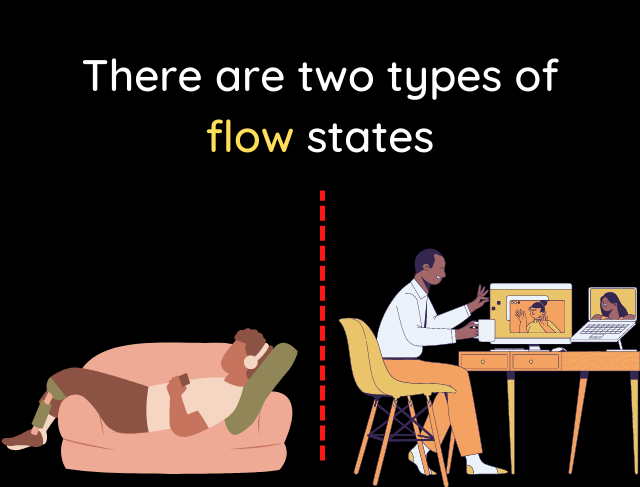
Flow is a state when you are so focused on the task that you forget about everything else. You immerse yourself in your work and forget how long you have been doing it.
Usually, there are two types of flow states people get lost in.
One is when you are doing your work and immersed in it; you forget everything else.
The other is when you are consuming content. You are watching a captivating series or a movie, and you forget the concept of time.
Usually, people get into the second type of state more easily. It is an easy escape from real-world problems.
It has to do with the human's innate nature to choose the path of least resistance.
Watching YouTube shorts, Netflix series and playing video games is easy. When you consume content, you don't have to do anything. You can sit and watch. But when you try to create content, you have to focus. You have to work hard. You have to be creative.
How Can You Motivate Yourself To Find Flow In Your Work?
One way to trick yourself into doing creative/hard work is to consume motivational content. Many people follow this strategy. For example, before exercising, people listen to the motivational content of bodybuilders. It pumps them for an intense workout.
Similarly, creative people consume the content of other creative people for inspiration.
If you follow this strategy correctly, it can do wonders. Everyone needs a tiny bit of motivation now and then. But if you depend on motivation to do your work, this strategy will fail. It is ineffective to achieve long-term results.
You can motivate yourself to achieve your daily goals, but you have to depend on routines for long-term results.
The reason is— when your motivation is high, it becomes easy to complete challenging tasks. Hard work feels effortless. But when your motivation is low, you don't have the will to do the easiest things.
When motivation is high, you can work out for hours, but doing one pushup becomes difficult when motivation is low.
When motivation is high, you can write an entire article in one sitting. But when it is low, you will procrastinate for weeks and writing one sentence becomes challenging for you.
Motivation can sometimes help you do hard things, but it comes and goes. You can't depend on it to consistently perform. You will avoid work when you lack motivation.
It becomes tricky because you have to wait for the inspiration to do your work. You can't sit and wait because you have to complete your work. Otherwise, you will lose your job/business.
So, there must be a better way.
A few months ago, I was reading "Atomic Habits" by James Clear. There was a chapter about building consistency and motivation.
Before reading it, I assumed I must motivate myself to be consistent in my work. But after reading it, I realized that motivation comes from action.
Start — And You Will Find The Motivation To Continue
You don't need the inspiration to start. You have to start, and motivation will come with action. Even the tiniest steps will build momentum so that you can move forward.
I often want to write, but when I don't have the motivation to do it, I start with the tiniest step — writing down ideas about topics. It builds momentum. Some of the topics are interesting. I pick one and write a few lines. The momentum becomes powerful, and I can write a few hundred words.
If I start with the goal of writing a complete article, it's a big task. It will kill the little motivation I had. However, if I build some momentum, I can do more work. Maybe complete the whole task.
Most of the friction you face is at the beginning of any task. Once you start, it becomes easy to continue. That's why building routines are so powerful. You set the time for an activity, and then you do it. You don't wait for motivation. Routines make it easier to build momentum in your daily life. And that's how you progress— practising a skill over a long time.
This strategy is a lot better than waiting for motivation.
Routines are powerful because once you build a habit, your self-doubt will fade away. You slowly get more confident in your ability to perform.
The more times you repeat a task, the easier it becomes to do. And then you understand how to grow in that field.
It's always hard in the beginning. Once you have done something for six months, it becomes manageable. Once you have done something for five years, it becomes a rigid habit.
For example, writing one article is quite tricky if you have never written something before. You would spend hours writing it. And still, it will come out below average. However, if someone has been writing daily for five years, the task becomes as easy as brushing your teeth. You don't even consciously notice the activity anymore.
Similarly, if you have never worked out seriously, doing a set of 25 pushups feels like an impossible task. But once you have built a workout routine, doing 100 pushups will be a warmup for you.
Once you have developed a routine, you don't need the motivation to do your work. You just do it!
Only then you develop the focus to get into flow state while doing your work.
Yay! 🤗
Your content has been boosted with Ecency Points
Use Ecency daily to boost your growth on platform!
Support Ecency
Vote for new Proposal
Delegate HP and earn more, by @palomap3.